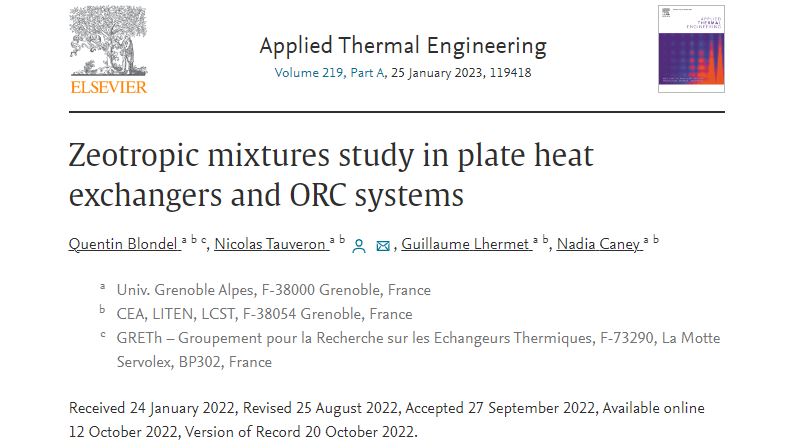Zeotropic mixtures study in plate heat exchangers and ORC systems
As part of its activities of technical and scientific literature watch and synthesis, GRETh promotes on its website, a number of publications: patents, thesis reports, articles. These documents are provided as abstracts or in their entirety for GRETh members (depending on the distribution rights imposed by the original publishers of these documents).
Thus, you will find here an article co-authored by GRETh on the study of zeotropic mixtures two-phase phenomena, in evaporation and condensation, within brazed plate heat exchangers :
« Zeotropic mixtures study in plate heat exchangers and ORC systems »
Summary :
Based on the known scientific literature, there are no correlations in the scientific literature to predict the two-phase heat transfer coefficients of Hydrofluoroethers pure fluids and zeotropic mixtures used in plate heat exchangers.
This work has allowed the development of evaporation and condensation correlations for such fluids. Correlations based on dimensionless numbers and working fluids critical properties gave promising results, with a prediction of the two-phase heat transfer coefficient around 15% for heat source and 50% for cooling source which led respectively to a prediction of 4% and 6% for the global thermal power exchanged.
The behavior of the Organic Rankine Cycle heat sources and the working fluids used within was also been studied. For this purpose, the influence of the heat sources flow rates variation on the performance of the hot and cold exchangers was analyzed. Results obtained showed a similar behavior and performance variation of the heat exchangers both when using pure fluids and zeotropic mixtures.
Zeotropic mixtures working fluids in ORC system are often supposed in the literature to significantly increase the performance of this thermodynamic cycle due to better heat transfer at the hot source. Nevertheless, the great majority of these studies are numerical and do not take into account the interactions and system effects existing within the thermodynamic cycle when using a mixture instead of a pure fluid. This work has allowed to highlight this complexity and to provide a better understanding of the use of zeotropic mixtures.

| Author(s) |
| Quentin BLONDEL, Nicolas TAUVERON, Guillaume LHERMET, Nadia CANEY |
| DOI |
| https://www.sciencedirect.com/science/article/abs/pii/S1359431122013485?via%3Dihub |
| Year |
| 2023 |
| Keywords |
| Organic Rankine Cycle (ORC), Zeotropic mixtures, low GWP fluids, waste heat, two phase correlations, heat transfer coefficient, condensation, evaporation, plate heat exchangers. |
♦ The full version is only available for GRETh "PREMIUM" members!
♦ If you are not a GRETh member, you can consult the offer proposed by GRETh clicking here as well as the conditions of membership by clicking here.
